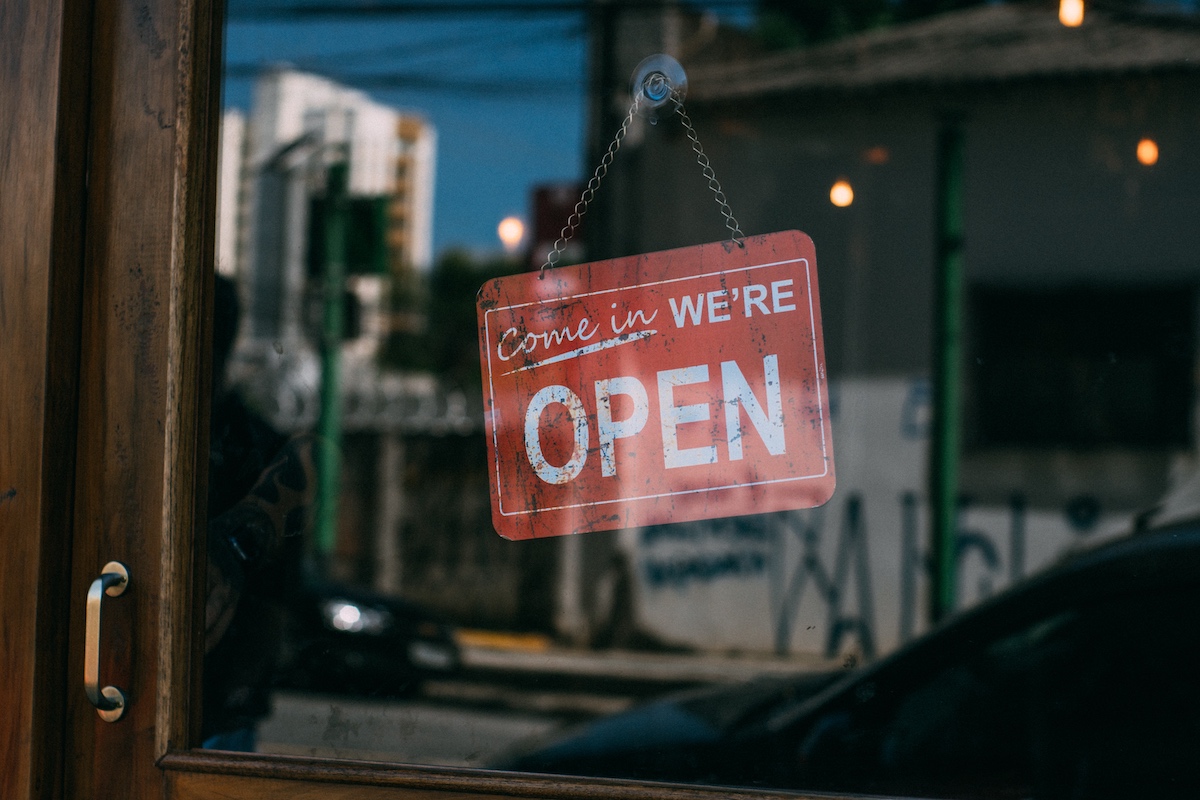Nina Ross calls her business a “pandemic baby.” Ross started Nina’s Cookie Explosion, a Baltimore-based food delivery company, last fall. Since then, she’s always had the same primary concern.
“I think that because we started in September of 2020, the pandemic has always been the first thing on my mind when we do anything new,” Ross said.
Over the past year and a half, small business owners like Ross have been forced to keep COVID-19 at the very top of their minds. The pandemic has required companies to adapt and change constantly, reacting to new developments in a situation that’s still changing all the time.
In some cities, the latest update has come in the form of strict vaccination requirements. Starting in August, New York City began requiring proof of vaccination for several indoor venues — including movie theaters, indoor dining and indoor gyms. Los Angeles County recently instituted a similar rule for bars, concerts, wineries and more.
If these rules extend to other cities, small businesses will need to be ready. Here are four ways business owners can prepare for stricter vaccine requirements and continue to navigate the nation’s ever-changing COVID-19 situation.
Adopt a flexible business plan.
For Sylva Lin, the past year and a half has been all about flexibility.
Lin is the owner of Culinary Architecture, a catering company and gourmet grocery store based in Baltimore. Throughout the pandemic, she’s stayed responsive, adding new features like online ordering, hand-washing stations and restrictions on how many customers can enter her store at once.
“Our business model is pretty fluid, and that’s one of the things that has helped us stay afloat — the ability to quickly adapt to new surroundings and changes,” she said. Lin doesn’t know what the future holds. That’s why she believes that if companies want to thrive amid that uncertainty, they have to be open to change.
Shifting your entire business model on a dime isn’t easy. However, there are ways smaller companies can fund quick, necessary changes. One great option is by launching a strategic crowdfunding campaign. Through sites like GoFundMe, Kickstarter or Indiegogo, business owners can ask for legitimate monetary donations that support a specific cause — say, purchasing contactless delivery tools, adding a hand-washing station and hiring new employees.
Embrace contactless purchasing.
One of the biggest changes in pandemic-era shopping has been the rise of contactless payments. Through platforms like Square, Apple Pay, Google Wallet and more, companies have allowed customers to check out with the tap of a phone or credit card — all without ever touching another person’s hands.
This boom has extended to delivery, too. According to a recent survey, 77% of Americans used an on-demand delivery service in 2020.
With the pandemic restricting person-to-person interactions, contactless delivery has become essential. It’s a trend Ross believes is here to stay.
“I don’t think we would have even thought about doing delivery if it wasn’t for the pandemic,” she said. “To be honest, I don’t think I would’ve started my business this early if it weren’t for the pandemic — because delivery is just such a huge part of everyone’s lives now.”
For companies looking to improve their delivery options, Ross recommends using a website hosting platform that offers contactless ordering options. She uses Wix, but platforms like Restolabs and FarEye also have software specifically designed for contactless delivery.
Take advantage of virtual interactions.
Contactless payments aren’t the only solution to pandemic restrictions, though. There are also plenty of ways small businesses can leverage the technology they already have at their fingertips.
For example, Lin started letting her customers submit grocery orders in advance via email. Meanwhile, Ross used text messages to alert her customers when a delivery was on its way — so they could be ready to receive their order with a mask on.
The changes were simple, but they were highly effective. They’re also evidence that small businesses don’t need to purchase new technology just to improve their virtual presence. It could be as easy as setting up a text alert system for customers or updating your website to list a full inventory of what you have in store.
Streamline the vaccine verification process.
The proof of vaccination question is still a “what if” for most small business owners. However, if the past year and a half have proven anything, it’s that it’s always best to prepare for the unknown.
“Our biggest concern is just that we don’t know the timeline of this pandemic at all,” Ross said. “You know, in March 2020 we thought this was gonna be two weeks.”
Paper vaccine cards are flimsy, easy to lose and in some cases, easy to forge — which is why digital versions may play a major role in the future. Soon, some business owners may find themselves asking employees and customers to verify their vaccination status with a smartphone, not a card.
The good news: It’s extremely easy to create and check digital vaccine cards. iPhones, for example, have a built-in document scanner that can digitize and save a person’s hardcopy card. From there, it’s easy to secure the card by locking it via face ID in the Notes app.
There are also already countless apps designed to hold vaccine cards, as well as several more in production. Currently, apps like VeriFLY and CommonPass will hold vaccine cards as a secured, verifiable, smartphone copy.
Before you go...
Please consider supporting Technical.ly to keep our independent journalism strong. Unlike most business-focused media outlets, we don’t have a paywall. Instead, we count on your personal and organizational support.
Join our growing Slack community
Join 5,000 tech professionals and entrepreneurs in our community Slack today!

The person charged in the UnitedHealthcare CEO shooting had a ton of tech connections

From rejection to innovation: How I built a tool to beat AI hiring algorithms at their own game

Where are the country’s most vibrant tech and startup communities?


